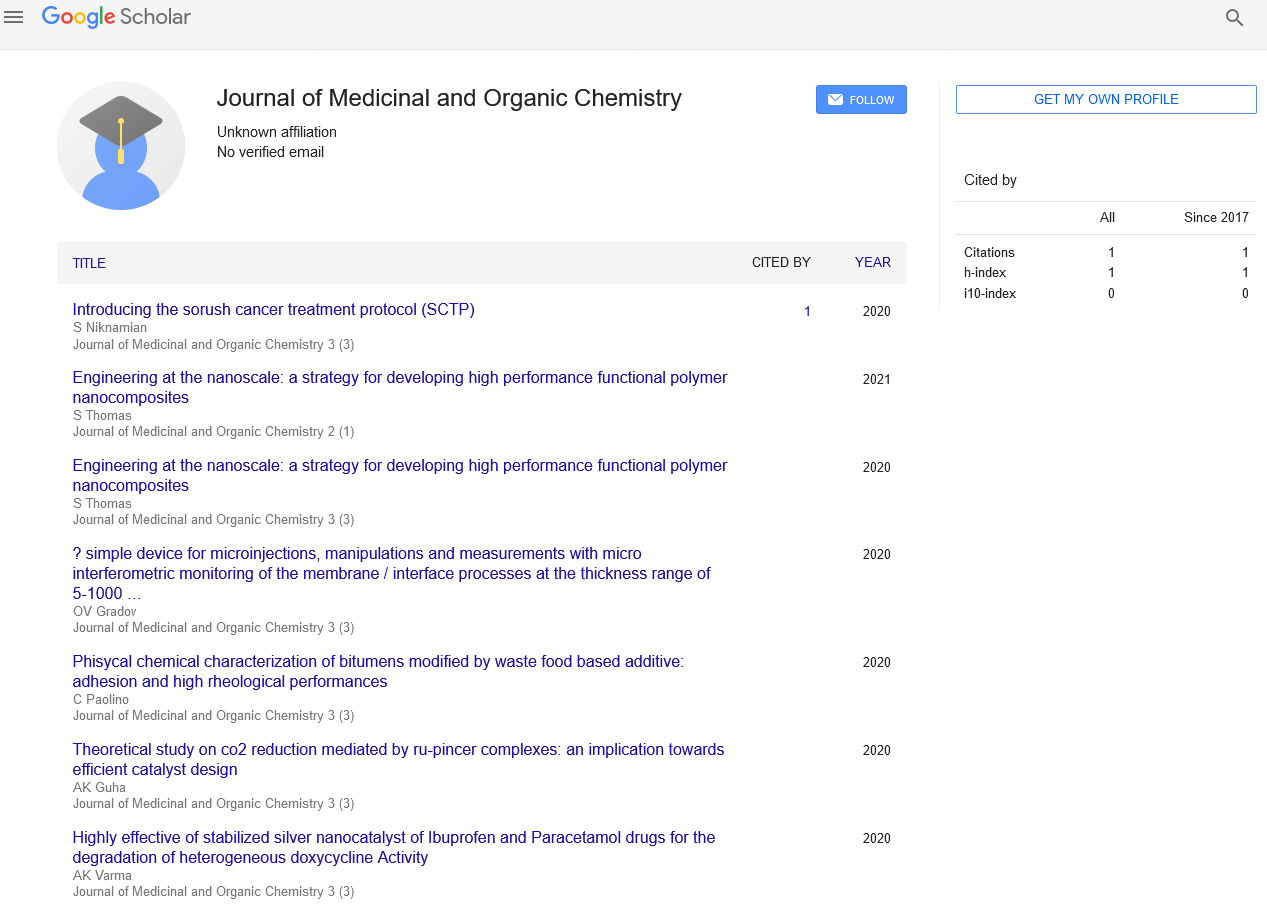Perspective - Journal of Medicinal and Organic Chemistry (2024) Volume 7, Issue 5
Psychosocial Research: An Overview
- Corresponding Author:
- Omar Larentis
Department of Psychosocial Research,
University of Pontificale,
Porto Alegre,
Brazil
E-mail: omar.larenti@uni.it
Received: 03-Jul-2024, Manuscript No. JMOC-24-140607; Editor assigned: 08-Jul-2024, PreQC No. JMOC-24-140607 (PQ); Reviewed: 22-Jul-2024, QC No. JMOC-24-140607; Revised: 01- Oct-2024, Manuscript No. JMOC-24-140607 (R); Published: 29-Oct-2024, DOI: 10.37532/ jmoc.2024.7(5).257-258
Introduction
Psychosocial research encompasses a broad field that intersects psychology and social science to explore the complex interactions between individuals’ psychological states and their social environments. This area of study is vital for understanding how social factors influence mental health, behavior, and overall well-being. By integrating psychological theories with social contexts, psychosocial research provides a comprehensive approach to addressing various human experiences and societal issues.
Description
Core concepts in psychosocial research
Several key concepts form the foundation of psychosocial research:
Social identity theory: This theory, developed by Henri Tajfel and John Turner, explores how individuals’ self-concepts are influenced by their membership in social groups. It examines how group affiliations impact behavior, attitudes and perceptions.
Stress and coping mechanisms: Psychosocial research delves into how individuals respond to stressors and the coping strategies they employ. This area of study is crucial for developing interventions to improve mental health and resilience.
Social support: The role of social networks and relationships in providing emotional, informational and practical support is a central theme in psychosocial research. Studies in this area investigate how social support buffers against stress and contributes to overall well-being.
Life course perspective: This approach considers how individual experiences and social contexts interact over time to shape developmental trajectories. It emphasizes the importance of timing, transitions and social change in understanding human development.
Methodological approaches
Psychosocial research employs a variety of methodological approaches, each offering unique insights into the complex interplay between psychological and social factors.
Quantitative methods: These include surveys, experiments and longitudinal studies that use statistical techniques to analyze data. Quantitative research allows for the examination of relationships between variables and the testing of hypotheses.
Qualitative methods: Qualitative approaches, such as interviews, focus groups and ethnographic studies, provide in-depth understanding of individuals’ experiences and perspectives. These methods are particularly useful for exploring complex social phenomena and generating rich, detailed data.
Mixed methods: Combining quantitative and qualitative techniques, mixed methods research offers a comprehensive approach to investigating psychosocial issues. This approach allows researchers to triangulate data and gain a fuller understanding of the research problem.
Key areas of study
Psychosocial research spans a wide range of topics, reflecting the diverse ways in which psychological and social factors intersect.
Mental health: Investigating the social determinants of mental health is a major focus of psychosocial research. Studies examine how factors such as socioeconomic status, discrimination and social support influence mental health outcomes.
Health behaviors: Research in this area explores how social and psychological factors affect health-related behaviors, such as smoking, diet and exercise. Understanding these influences is crucial for designing effective health promotion interventions.
Workplace dynamics: Psychosocial research examines how work environments impact employees’ mental health, job satisfaction, and productivity. Topics include job stress, work-life balance and organizational culture.
Family and relationships: This area of study investigates the dynamics of family relationships and their impact on individual well-being. Research topics include parenting, marital satisfaction and the effects of family transitions such as divorce or bereavement.
Community and society: Psychosocial research also addresses broader social issues, such as community resilience, social cohesion and the impact of social policies. This research informs efforts to promote social justice and improve community well-being.
Applications and implications
The findings of psychosocial research have wideranging applications across various domains, including healthcare, education and public policy.
Clinical practice: Insights from psychosocial research inform the development of therapeutic interventions and mental health services. Understanding the social context of mental health issues allows clinicians to provide more holistic and effective care.
Public health: Psychosocial research contributes to the design and implementation of public health initiatives aimed at improving population health. For example, studies on social determinants of health guide efforts to address health disparities and promote health equity.
Education: In the field of education, psychosocial research informs strategies to enhance student well-being and academic performance. Topics such as school climate, teacher-student relationships and peer influence are central to this area of study.
Policy development: Policymakers draw on psychosocial research to create policies that address social inequalities and promote societal well-being. Research on the impact of social policies on mental health and quality of life provides valuable evidence for decision-making.
Future directions
As society continues to evolve, psychosocial research will remain a dynamic and vital field. Future research will likely explore new and emerging issues, such as the psychosocial impact of digital technologies and the effects of global crises like climate change and pandemics.
Digital era: The increasing integration of digital technologies into daily life presents new challenges and opportunities for psychosocial research. Studies will examine the effects of social media, online communities and digital communication on mental health and social relationships.
Global crises: Events such as climate change and pandemics have profound psychosocial implications. Future research will investigate how individuals and communities cope with these crises and develop resilience.
Intersectionality: A growing emphasis on intersectionality will enrich psychosocial research by considering how multiple social identities and systems of oppression intersect to influence individuals’ experiences and outcomes.
Conclusion
Psychosocial research plays a crucial role in advancing our understanding of the intricate relationships between psychological and social factors. By integrating diverse methodologies and theoretical perspectives, this field provides valuable insights into a wide range of human experiences and societal issues. As we navigate the complexities of the modern world, psychosocial research will continue to inform efforts to promote mental health, well-being and social justice.

